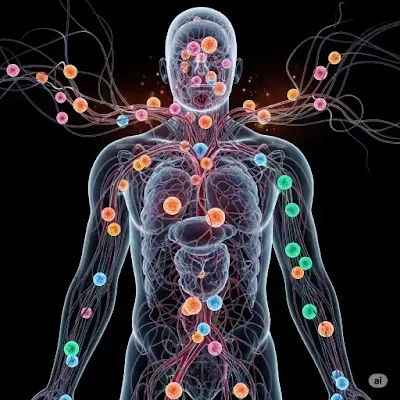- Get link
- X
- Other Apps
- Get link
- X
- Other Apps
Hormones: Your Body's Silent Messengers
Have you ever wondered what makes your body do what it does, from growing taller to feeling hungry or even falling in love? The unsung heroes behind these incredible processes are tiny chemical messengers called hormones.
Let's explore these fascinating compounds, understand what they do, and learn how to keep them in balance.
What Are Hormones?
Imagine your body as a vast, complex orchestra. Hormones are like the conductors, sending signals to different parts of the orchestra (your organs and cells) to ensure everything plays in harmony.
The Major Players: A Glimpse at Key Hormones and Their Functions
While there are dozens of hormones, let's look at some of the most prominent ones and their crucial roles:
- Insulin: (Produced by the Pancreas) Often called the "key to your cells," insulin helps regulate blood sugar levels by allowing glucose (sugar) to enter cells for energy.
- Function: Controls blood sugar, promotes glucose uptake by cells, stores excess glucose as glycogen.
- Thyroid Hormones (T3 and T4): (Produced by the Thyroid Gland) These are your body's metabolic maestros.
- Function: Regulate metabolism, energy production, body temperature, heart rate, and growth and development.
- Cortisol: (Produced by the Adrenal Glands) Known as the "stress hormone," but it does much more.
- Function: Helps the body respond to stress, regulates metabolism, reduces inflammation, and influences blood pressure.
- Estrogen: (Primarily produced by Ovaries in females, also in testes in males, and adrenal glands) The primary female sex hormone.
- Function: Develops female secondary sexual characteristics, regulates the menstrual cycle, supports bone health, and affects mood.
- Testosterone: (Primarily produced by Testes in males, also in ovaries in females, and adrenal glands) The primary male sex hormone.
- Function: Develops male secondary sexual characteristics, builds muscle mass, supports bone density, and influences libido.
- Function: Develops male secondary sexual characteristics, builds muscle mass, supports bone density, and influences libido.
- Growth Hormone (GH): (Produced by the Pituitary Gland) Essential for growth and development.
- Function: Stimulates growth, cell reproduction and regeneration, and metabolism.
- Melatonin: (Produced by the Pineal Gland) Your body's sleep regulator.
- Function: Regulates sleep-wake cycles (circadian rhythm) and promotes restful sleep.
- Function: Regulates sleep-wake cycles (circadian rhythm) and promotes restful sleep.
- Adrenaline (Epinephrine): (Produced by the Adrenal Glands) The "fight or flight" hormone.
- Function: Prepares the body for immediate action by increasing heart rate, blood pressure, and energy supply.
When Hormones Go Awry: Symptoms to Watch For
When your hormones are out of whack, your body will often send signals. Recognizing these symptoms early can be crucial for seeking appropriate medical advice.
- Thyroid Dysfunction (Hypo- or Hyperthyroidism):
- Hypothyroid: Fatigue, weight gain, constipation, dry skin, hair loss, feeling cold, depression, brain fog.
- Hyperthyroid: Unexplained weight loss, rapid heartbeat, anxiety, irritability, sweating, heat intolerance, tremors, difficulty sleeping.
- Insulin Resistance/Diabetes:
- Increased thirst and urination, unexplained weight loss, fatigue, blurred vision, frequent infections, slow-healing sores.
- Cortisol Imbalance (Adrenal Fatigue/Cushing's Syndrome):
- High Cortisol: Weight gain (especially around the abdomen), high blood pressure, difficulty sleeping, anxiety, muscle weakness, thin skin.
- Low Cortisol: Chronic fatigue, low blood pressure, dizziness, salt cravings, lightheadedness.
- High Cortisol: Weight gain (especially around the abdomen), high blood pressure, difficulty sleeping, anxiety, muscle weakness, thin skin.
- Estrogen Imbalance (in females):
- High Estrogen: Bloating, breast tenderness, mood swings, heavy or irregular periods, weight gain.
- Low Estrogen: Hot flashes, night sweats, vaginal dryness, low libido, mood changes, bone loss.
- High Estrogen: Bloating, breast tenderness, mood swings, heavy or irregular periods, weight gain.
- Testosterone Imbalance (in males):
- Low Testosterone: Fatigue, decreased libido, erectile dysfunction, loss of muscle mass, increased body fat, mood changes, depression.
- Growth Hormone Deficiency:
- Fatigue, decreased muscle mass, increased body fat, reduced bone density, impaired exercise capacity.
- Melatonin Imbalance:
- Difficulty falling asleep, frequent waking, non-restorative sleep, daytime fatigue.
Important Note: These symptoms can also indicate other health conditions. If you experience persistent or concerning symptoms, always consult a healthcare professional for an accurate diagnosis and personalized advice.
Fueling Your Hormones: Natural Major Sources (Through Diet)
While hormones are produced internally, certain nutrients are essential building blocks and regulators.
- Healthy Fats: Crucial for the production of steroid hormones (estrogen, testosterone, cortisol).
- Sources: Avocados, nuts (almonds, walnuts), seeds (chia, flax, pumpkin), olive oil, fatty fish (salmon, mackerel).
- Protein: Provides amino acids, which are the building blocks of many hormones.
- Sources: Lean meats, poultry, fish, eggs, dairy, legumes, quinoa, tofu.
- Fiber: Helps regulate blood sugar and promotes healthy gut bacteria, which can influence hormone balance.
- Sources: Fruits, vegetables, whole grains, legumes.
- Cruciferous Vegetables: (e.g., broccoli, cauliflower, cabbage, Brussels sprouts) Contain compounds that help metabolize estrogen.
- Sources: Broccoli, cauliflower, kale, cabbage.
- Sources: Broccoli, cauliflower, kale, cabbage.
- Vitamin D: Acts like a hormone itself and plays a role in numerous bodily functions, including hormone regulation.
- Sources: Sunlight exposure, fatty fish, fortified dairy/plant milks, egg yolks.
- Magnesium: Involved in over 300 biochemical reactions, including hormone synthesis and function.
- Sources: Leafy greens, nuts, seeds, dark chocolate, avocados, legumes.
- Zinc: Essential for the production of various hormones, including testosterone and thyroid hormones.
- Sources: Oysters, beef, pumpkin seeds, lentils, chickpeas.
- B Vitamins: Crucial for energy metabolism and nerve function, indirectly supporting hormone health.
- Sources: Whole grains, meat, eggs, dairy, leafy greens.
Conclusion
Hormones are the unsung heroes of your body, orchestrating a complex symphony of functions that keep you healthy and thriving.
common hormones
endocrine system
healthy hormones
hormone balance
hormone deficiency symptoms
hormone health diet
Hormones
natural hormone support
- Get link
- X
- Other Apps

Comments
Post a Comment